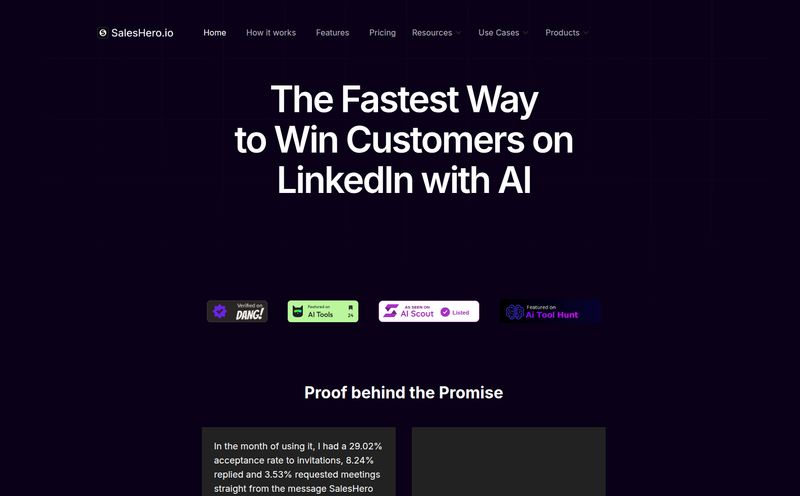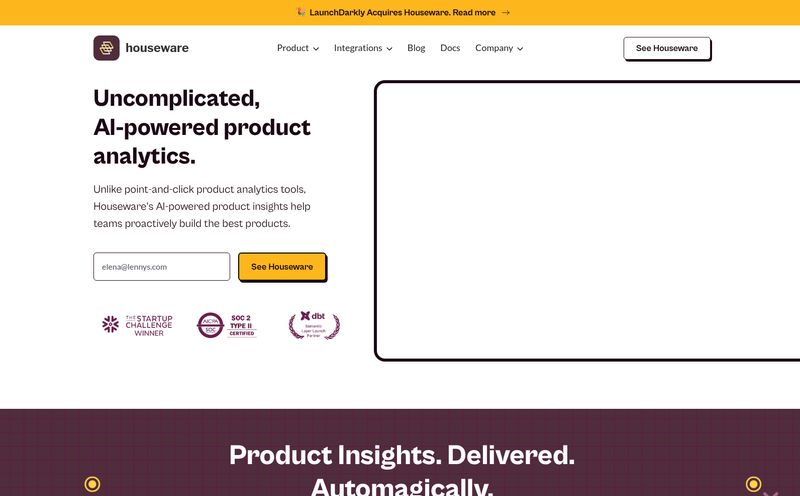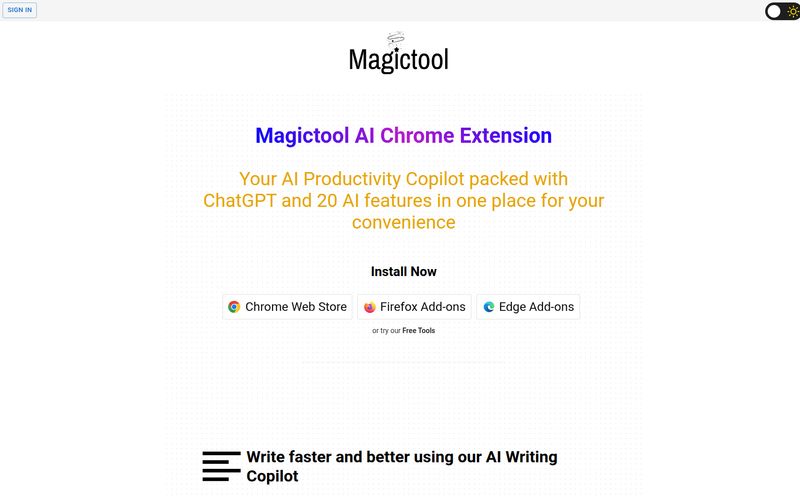If you’re in SEO, marketing, or any corner of the digital world, you probably live in spreadsheets. I know I do. My Google Drive is a graveyard of untitled sheets, campaign trackers, and keyword research docs that seemed like a good idea at the time. We wrestle with pivot tables, pray our VLOOKUPs don't break, and spend more time wrangling data than actually understanding it. It’s a grind.
For years, we've just accepted this as the cost of doing business. Excel and Google Sheets are the undisputed kings, the default tools for… well, everything. But lately, I’ve been asking myself, is this it? Is this the peak of data analysis for the common person?
Then a tool called Lychee popped onto my radar. It’s being whispered about as an AI-powered alternative to the spreadsheet giants, a way to get to the insights without the formula-induced headaches. And I have to say, my curiosity is piqued. A tool that promises the power of data analysis without the steep learning curve? Sign me up.
What Exactly is Lychee? (And Why Should You Care?)
At its core, Lychee is a data analysis and visualization tool. Big deal, right? There are a lot of those. But its secret sauce, the thing that makes it interesting, is the “AI-powered” part. Instead of you having to tell the software how to calculate something with a precise formula, the idea is that you can ask it what you want to know. It’s a subtle but massive shift.

Visit Lychee
Think about it. We spend so much time learning the syntax of spreadsheets. What if that time was spent just… thinking about the data? It’s a move from being a data technician to a data strategist. For anyone who has ever stared at a screen wanting to throw their laptop out the window because of a `#REF!` error, this is a pretty compelling proposition. It's not just a new feature; it's a whole new way of working.
The $13,000 Product Launch Experiment: Putting Lychee to the Test
Now, this is where the story gets really good. A tool can have all the fancy features in the world, but I’m always skeptical until I see it in action. And boy, did Lychee get a workout.
I came across a fascinating case study where a team spent a whopping $13,460 testing a curated list of product launch platforms. We're talking about those AI directories and startup listing sites that promise a flood of traffic when you launch something new. They put their money where their mouth is, listing their product on a bunch of them to see what actually worked. And the tool they used to analyze the results—the traffic, the clicks, the ROI—was Lychee.
This is what sells me on a concept. It wasn't just a demo with clean, perfect data. It was a real-world, messy, expensive experiment. They used Lychee to score the platforms and figure out which ones delivered and which ones were just a waste of money.
The Launch Platforms Under the Microscope
So, what kind of platforms were they analyzing? This is where it gets super valuable for any of us looking to launch a product, a service, or even just a side project. The pricing information below isn't for Lychee itself, but for the services that were put to the test in this experiment. It gives you a real-world look at the 'pay-to-play' launch scene.
| Platform/Service | Cost | What You Get |
|---|---|---|
| There's An AI For That Directory Listing | $347 | A directory listing. |
| TopAI.tools Boosted Promo | $229 | 7-day feature, fast-tracked, top page placement. |
| TopAI.tools One-Time Fee | $45 | A one-time fee for listing. |
| ToolifyAI Listing | $49 | A simple listing process. |
| PitchWall Feature | $99 | A feature on their platform. |
| StartupBuffer Premium Listing | $299 | Image links with full backlink strength via 301 redirects. (That's a nice SEO touch.) |
| StartupBuffer Fast Publishing | $19 | Publishing within a week. |
Seeing this data, you start to realize the challenge. With all these different price points and promises, how do you even begin to compare them? That's the problem Lychee was built to solve.
So, Can Lychee Really Replace Excel or Google Sheets?
Okay, let's get down to it. Is it time to uninstall Excel? In my opinion… not quite yet. But that’s not the right question. Think of it this way: Excel is like a massive, sprawling old city. It's got everything you could ever need, but it’s overwhelming, the traffic is terrible, and you need a detailed map to get anywhere. Lychee, on the other hand, feels more like a sleek, new monorail. It doesn’t go everywhere, but for its specific routes—like analyzing campaign data or scoring leads—it gets you there faster and with a much better view.
The main hurdle I see is that there's still limited information on Lychee's specific features. It's a bit of a black box. We see the impressive outcome, but not all the nuts and bolts. And let's be real, the muscle memory for spreadsheets is strong. We've been conditioned for decades.
But for specific tasks? I'm incredibly optimistic. The potential to analyze SERP volatility against my content updates, or to correlate social media engagement with actual traffic spikes without building a monstrous spreadsheet… that’s genuinely exciting. It’s not a replacement; it’s a specialist. A powerful addition to the toolkit.
Who is Lychee Actually For?
I’ve been mulling this over, and I think Lychee hits a sweet spot for a few groups of people:
- Startup Founders & Indie Hackers: You’re wearing a dozen hats, and “data scientist” probably isn’t one of them. You need to know if your launch spending is working, and you need to know now. This seems perfect for that.
- Growth Marketers & SEOs: We are drowning in data. Keyword rankings, backlink profiles, CPC trends, traffic sources. A tool that helps find the signal in the noise could be the difference between a good campaign and a great one.
- The “Data-Curious” but “Formula-Phobic”: You know there are valuable insights in your numbers, but you just can't stomach the idea of learning complex functions. An AI assistant that speaks plain English could be the bridge you need.
A Word on That Big Budget...
I know what some of you are thinking. “Sure, great analysis, but who has $13k to blow on testing launch sites?” And that’s a fair point. Most of us don't have that kind of experimental budget.
But here’s how I see it: we get the benefit of their spending. They took the financial risk, and now we have the data. The real takeaway isn't the budget; it's the method. It's about being rigorous in tracking your efforts, whether you're spending $13,000 or just $130 on a few boosted posts. The principles of measuring ROI are the same, and a tool like Lychee can help at any scale. It’s about being smart with whatever budget you have.
Frequently Asked Questions about Lychee
I've seen a few questions pop up, so let's tackle them head-on.
What is Lychee in simple terms?
Lychee is a data analysis tool that uses artificial intelligence to help you understand your data. Think of it as a smart assistant for your numbers, designed to be an easier, more intuitive alternative to traditional spreadsheets like Excel for specific analysis tasks.
Is Lychee a good alternative to Excel?
It's more of a powerful specialist than a direct replacement. For day-to-day spreadsheet tasks, Excel and Google Sheets still rule. But for complex data analysis, finding trends, and visualizing results without writing formulas, Lychee presents a very strong case. I'd see it as a tool you use alongside spreadsheets.
How much does Lychee cost?
This is the million-dollar question! The information available right now is a bit murky on Lychee's specific pricing. The costs you see in this article are for the various launch platforms that were analyzed using Lychee. I'd recommend keeping an eye on the source of the case study, theresanaiforthat.com, for any updates.
What kind of data can I analyze with Lychee?
Based on the case study, it’s great for marketing and sales data—things like traffic, user sign-ups, revenue, and ROI from different channels. It stands to reason it would be equally effective for analyzing SEO data, customer feedback, or any dataset where you're looking for patterns and correlations.
Where can I find Lychee?
The case study and the tool seem to be closely associated with the website `theresanaiforthat.com`. That seems to be the best place to start looking for more information on Lychee itself.
Final Thoughts
Look, the world of SEO and digital marketing is constantly changing. The tools we used five years ago are ancient history, and the tools we'll use five years from now are probably just being imagined. Lychee is a perfect example of this evolution. It represents a shift away from manual, tedious data work toward a future where our tools are genuine partners in discovery.
Will it take over the world? Probably not. But does it offer a glimpse into a smarter, more efficient way to work with data? Absolutely. And for me, that’s more than enough to be excited. It’s a reminder that we should always be looking for a better way to do things, because chances are, someone, somewhere, is building it.
Reference and Sources
The case study and platform data discussed in this article were drawn from information related to theresanaiforthat.com. The pricing for the various launch services can be explored further on their submissions page: https://theresanaiforthat.com/get-featured/.



